#how to create inclusive spaces for autism
Explore tagged Tumblr posts
Text
💫 James Hunt united Burnham-on-Crouch on World Autism Awareness Day 2025, advocating for 365-day autism acceptance with community-wide events. 💫 Explore Hunt’s inspiring story, the town’s initiative, and actionable ways to support autistic individuals year-round—click to learn how to make 2025
#autism acceptance initiatives in Essex 2025#autism awareness#autism awareness 365 days 2025#autism employment barriers 2025 solutions#how to create inclusive spaces for autism#james hunt#James Hunt autism advocacy Burnham-on-Crouch#neurodiversity awareness in communities 2025#Stories About Autism Instagram impact#supporting autistic individuals year-round 2025#systemic challenges for autistic people UK#World Autism Awareness Day 2025 events
0 notes
Note
bro im the same way about people trying to tell me im autistic like hi i didn't ask ur opinion!! its weird and a common overstep of boundaries ??! nobody ive seen rly talks about that so ya. i hear u fr
RHAhhhhhhhhh thank u for this comment. i’ve been thinking about this a lot lately and been working on a script for it but i’m also worried its not productive to post/won’t be helpful/will be harmful ... but since u sent this ask, im gonna give a little spiel. (aka copy pasting stuff from my script im working on)
The history of psychiatry is FULL of pathologizing people who don't conform.
I want to be really clear about something: I’m not anti-label. I’m not here to shame anyone for seeking a diagnosis, or self diaognosing as autistic, ADHD, or otherwise neurodivergent. For many people, those words offer community, validation, and access to care. I fully support people embracing the language that helps them feel understood.
what I don’t support is being labeled by others—without my consent.
I’m not in denial. I have my own suspicions, my own experiences, my own rhythms and ways of being. But I’ve also made the intentional choice not to seek a diagnosis—not because I think it’s shameful, but because I don’t want or need it to understand myself. My brain is mine. I like it, & I don’t need a category to validate it/understand how it works.
mental illness is real. neurodivergence is real. but a lot of what makes them unbearable is the world we’re expected to function in. the goal shouldn’t be “how do I fix myself?” but “why is the world so hostile to softness, fluctuation, and need?”
Like ... labels should be helpful, if your autism diagnosis or finding out what autism traits you related to made YOU feel more comfortable, more understanding and able to express yourself, that’s amazing, I am happy for you!!!! It’s not that I’m ignorant of WHY people think I’m autistic. It’s just. Not how I personally choose to understand my brain! I don’t relate to the label ! I’m sorry!!! I’m happy if you do, but the label does not feel helpful to me or like I chose it for myself;.
Let me flap my hands. Let me lose my train of thought. Let me stim or fidget or spiral without assuming I’ve failed some unspoken neurotypical standard—or passed some secret test that earns me some neurodivergent badge. Let people have their brains. Without labeling them. Without “diagnosing” them. Without turning the spectrum of human behavior into a taxonomy of correctness.
There’s a difference between self-recognition and social labeling. Some people find immense relief in terms like ADHD or autism—it helps them understand their needs, find community, and access care. That’s WONDERFUL!!!! That’s valid.
But not everyone wants, needs, or benefits from those labels. And no one should be pressured into claiming an identity that doesn’t resonate, just because someone else finds it familiar.
I am trying to create space that doesn’t require proof of suffering or identity to be treated with basic respect and care.
let people have their brains. without diagnosis, without moral panic, without gatekeeping or pathologizing.
Neurodiversity also includes people who choose not to label themselves. Mental health acceptance MUST include the right to decline categorization, to refuse treatment, to not be coerced—by the state, by the medical system, or by strangers on the internet who think they’re being supportive.
If we truly want a more inclusive world, we need to move away from the idea that diagnosis = identity, or that only labeled brains are allowed to be strange, brilliant, scattered, or alive in ways that don’t fit the mold.
ps i think autistic people are super cool! i think adhd folks are awesome! i just don't relate to those labels as a way of understanding myself....
also, foucault talking about the body and brain and how they are medicalized seriously radicalized me .. this vid might be handy for anyone curious (its 8 min and a good intro IMO) https://www.youtube.com/watch?v=BBJTeNTZtGU
#ask#asks#im just worried something like this will come off as me saying like 'I'm soOoO much better than autistic people' but thats not what i think#at all#i cant stop you from thinking im autistic but i would request you didnt make assumotions about it#like whne my old co worker would be like oooh youre so adhd#SHUT THE FUCK UP U DONT KNOW MY DIAGNOSIS ITS WEIRD HOW PEOPLE THINK ITS QUIRKY TO ASSIGN DIAGNOSISIS TO OTHERS#sorry for yellinfg#also i get people dont mean it in a negative way! i get it; i know 'autistic icon' is like supposed to be meant as a compliment#but could you just compliment the thing u actually like / or say the specific thing you relate to#like; “rabbit; i relate to how fast you talk” = cool#“rabbit; we're adhd twinsies” = mm less cool
37 notes
·
View notes
Text
Hey there!
I am doing a service project advocating for adults on the autism spectrum with Luv Michael, a nonprofit dedicated to empowering individuals through work and education. As part of my project, I am:
-Creating a local resource database for families.
-Contacting local officials to promote policies supporting individuals on the spectrum.
- Raising funds to help Luv Michael grow and continue its mission.
https://secure.givelively.org/donate/luv-michael-inc/luv-michael-volunteer-program-2025/ezra-agarwal
I can earn a volunteer’s certificate if I raise $75 or more. Will you please help me reach my goal while also supporting autistic adults? Every donation counts!
Autistic adults especially those with high needs require support related to vocational training, independent living and inclusive community, for which there aren't enough resources, luv micheal aims to provide all such necessary aid while increasing awareness and while I can't say I'm personally affected by it, I also experience overwhelming feelings and sensory sensitivity in social situations even though nowhere near that level, It makes me feel deeply for them, for whom its more and worse on another level and how many public spaces and sectors do not even consider their existence, let alone challenges.
I’d really appreciate it if you could support a cause that means so much to me!
You can check out their website with this link:
PS- US based donors get free thank you granola bar ;)
4 notes
·
View notes
Text
Dismantling Stereotypes at the Expense of Creating New Ones
This happens in most mental health communities, including the autism, PD, and OSDDID communities. People are so often preoccupied with dispelling stereotypes that they exclude people who fit those stereotypes and create new ones, further enforcing people into boxes.
I don't think I need to tell you why that isn't helpful, but I will anyway. You wouldn't like to be alienated from your own community, would you? Well, by perpetrating further stereotypes, you're alienating and excluding others from their communities no matter how many other people you're including. The mental health community and its subgroups are meant to be a safe and inclusive space to all struggling with certain disorders. It's not fair to only include those who fit your narrative of what people with X disorder are "actually" like.
Some examples of stereotypes the MH community has dispelled by creating new ones:
"Autistic people/People with BPD don't feel empathy" > "Autistic people/People with BPD feel hyperempathy"
"People with NPD/ASPD don't feel any type of empathy" > "People with NPD/ASPD still feel compassion/sympathy"
"People with ASPD/NPD don't feel love/emotions" > "People with ASPD/NPD feel love and emotions the same as other people"
There's more examples, but I'm only listing these.
By perpatrating these new stereotypes, you're excluding and even demonizing those that do not fit into those stereotypes. I have autism, BPD, NPD, and ASPD, I do not feel any kind of empathy nor compassion and sympathy, I do not feel love of any kind, and I have very little emotions/emotional range. I do not fit the stereotypes, and it makes me feel excluded from communities meant to be welcome for people like me. Something needs to change. Not all stereotypes need to be completely demolished. Some people still fit those stereotypes, and they deserve to feel included.
#DID#trauma#mental illness#dissociative identity disorder#mental health#mental health community#mental disorders#autism#personality disorder#PDs#BPD#ASPD#NPD#antisocial personality disorder#narcissistic personality disorder#borderline personality disorder
112 notes
·
View notes
Note
I'm gonna remain anonymous for safety reasons but I had this unpopular opinion like instead of seeking spaces where their needs and religious lifestyle get to be accommodated, they expect everyone where the majority do things differently to cater to them.
For example, I once had a classmate in school who's diagnosed with autism and obviously they struggle to fit into a normal school setting (they were disruptive and prone to have meltdowns) and I can't help but wonder why their parents couldn't just send them to a school where their needs could be met. Not many of us are on the spectrum, let alone taught how to deal with people with special needs at a young age.
They had the audacity to say "Then educate yourself!" and "You're just ableist!" while forgetting people also have their own struggles (e.g. many people I know . Why not have an aide to check on the kid or send them to a special school?
Second, a parent gets mad at a family during a birthday party because the host didn't know that their kid was allergic to nuts and had eaten something that has caused that kid to have an allergic reaction. Parent never even told the host beforehand about it.
The third one is how some Muslims in other predominantly Christian countries demand that non-Muslim people to stop eating because they're fasting. If I know I'm not part of the majority and something is not made for me, surely I'm not gonna demand they cater to me.
My apologies if I sound a bit harsh and insensitive but as much as I want to help create inclusive spaces, even as a kid I feel like some people need to also do the work and not expect everything to cater to them. I just want to get this off my chest and share my thoughts.
Some people may say it is harsh, but I generally agree with all your examples and conclusions Anon.
Forcing a child with more significant autism into a normal school environment is not unusual however. And usually a sign of parents who are unwilling to educate themselves of their child's needs. The common underlying reasoning for that decision is to try and force their child into structured environments to "force them to be normal" instead of meeting them where they are.
I have an older brother who is autistic, but was never diagnosed. Not because it isn't apparent he struggles and my parents just missed him, but because my mother couldn't stand the blow to her ego if her child was somehow defective. He is now close to 40 and can't function in society despite how she forced him to succeed in academics. He actually did really well in school, but because he was never given any support for his condition, he's never been able to hold down a job longer than a couple weeks.
The second point you offered is just as entitled and a good example of narcissistic parents. They assume the world revolves around them. Not communicating needs or expectations, but quick to point fingers when something goes wrong. Because the idea they could ever be at fault is an affront to their own world view. They are perfect, it's everyone else who is the problem.
And I agree overall with the statement you made about not oppressing others just because they are different. It doesn't matter if you are a minority or the majority, trying to control other people's actions when it has no effect on you is oppression. We have made this some moral Olympics, but it's not about morals. It's life; tangible, physical, practical life. And that's not about good and bad, it's about what you're willing to do to get your way.
Will you kill your neighbors to keep them from eating during Ramadan? Will you try and sue the family because they eat nuts? Are you going to burn down the school because you can't cope with the fact your child is different?
If you aren't actually going to do something about it, then you obviously aren't the person in the right. And if you do act on it and face repercussions, that doesn't make it an injustice. The fact is there is no good or bad at the end of the day. It is all about whoever believes strong enough to do something and whomever is strong enough to win. People often see Might Makes Right as something barbaric, and it is. But that doesn't make it untrue.
The entire world that we are watching collapse around us was based on the belief of American Exceptionalism. American might coded the entire framework of the global political landscape. Now that the belief in American Exceptionalism is dying so is American power and American influence.
New powers are rising in the form of the people, with less walls surrounding us from our others. And if we hope to survive the collapse of an empire, we really do need to be prepared to fight. Because in the end, whoever wins gets to write the new rules.
#anon ask#us history#us politics#whoever is willing to fight has more ground than those who wont#whoever wins gets to write the new rules#opression is not just systemic#its a mindset
2 notes
·
View notes
Text
Neurodiversity
We're talking ADHD, autism, dyslexia - all the amazing brainpower variations that make the world a more interesting place. And guess what? This neurodiversity is a superpower in the workplace!
Why? Let's break it down:
Thinking Outside the Box: Neurodivergent folks often see things differently, coming up with crazy-cool ideas that might get missed by the neurotypical crowd. Innovation station, anyone?
Deep Dives: Ever get hyperfocused on something? That's a neurodivergent superpower! They can become subject-matter experts in record time, diving deep into complex issues.
Detail Detectives: Some neurodivergent minds have a hawk-eye for detail. They'll spot errors no one else sees, keeping your projects on point.
So how do we harness this awesome power?
Embrace It! Let everyone know your workplace welcomes neurodiversity. Spread awareness and celebrate different thinking styles.
Make Adjustments: Small changes can make a big difference. Offer flexible work arrangements, quiet spaces, or noise-cancelling headphones.
Open Communication: Talk openly about neurodiversity! The more everyone understands, the more supportive the environment becomes. ️
By creating a space that celebrates neurodiversity, you get:
Innovation Explosion: Diverse perspectives lead to more creative solutions and problem-solving approaches.
Productivity Power-Up: Supported and valued employees are happy and productive employees!
Top Talent Magnet: Showcasing your commitment to inclusion attracts the best and brightest, regardless of their neurotype.
Neurodiversity isn't a weakness, it's a strength! Let's build workplaces that celebrate different ways of thinking.
Want to learn more? Check out this blog post for a deep dive into creating a neurodiversity-friendly work environment! https://socious.io/blog/the-untapped-potential-embracing-neurodiversity-in-the-workplace
8 notes
·
View notes
Text
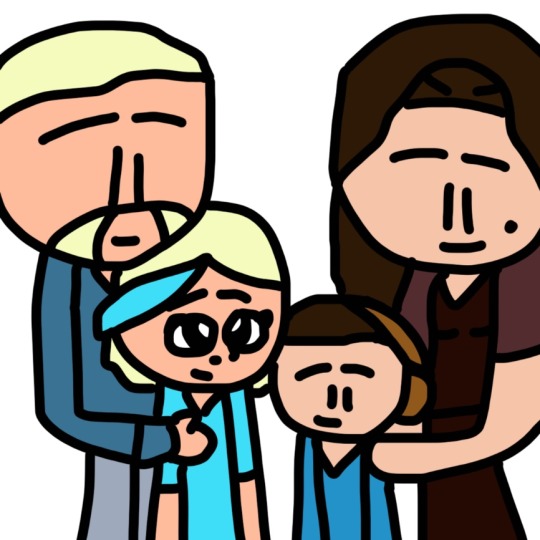
The Moscow family!
Featuring: mark moscow, snowy Moscow, John Moscow, and Jess Moscow
Snowy:
Age: 16
Likes: clubs especially poetry club, reading, poems
Dislikes: making mistakes, being late, missing out on clubs
Personality: resilient, caring, helpful
John:
Age: 8
(Diagnosis: autism)
Likes: puzzles, being smart, notes, space exploration
Dislikes: unexpected changes, losing snowy, being dumb
Personality: smart, gentle, intelligent
Jess:
Age: 44
Likes: mark, snowy, John, being a therapist
Dislikes: seeing John not control himself, losing snowy and/or John, late meetings
Personality: helpful, gentle, honest, caring
Mark:
Age: 50
Likes. Jess, snowy, John, being a IT specialist
Dislikes: corrupted computers, late works, losing snowy and/or John
Personality: helpful, good at jokes, and supportive
Backstory:
(How it all started)
How Jess Met Mark:
Jess and Mark met during a tech conference, where Jess was invited to speak about communication strategies for children with special needs, and Mark was there representing his company’s latest software innovation. They struck up a conversation during a break, and their connection was immediate. Mark was impressed by Jess’s passion and expertise, while Jess found Mark’s calm demeanor and genuine interest in her work refreshing.
Their first date was at a cozy café near the conference venue, where they talked late into the evening about their lives, careers, and shared values. Despite coming from different professional backgrounds, they found common ground in their commitment to helping others and a mutual appreciation for family and community. From there, their relationship blossomed, marked by a shared sense of purpose and mutual respect.
Engagement and Wedding:
Mark proposed to Jess during a trip to the mountains, at the end of a scenic hike that overlooked a beautiful valley. He chose the spot because it symbolized the journey they had been on together, with its ups and downs and the breathtaking views that made every challenge worthwhile. Jess, deeply touched by the gesture and the thought Mark put into the proposal, joyfully accepted.
Their wedding was a heartfelt celebration with close friends and family, reflecting their love for simplicity and personal connections. The ceremony was intimate, filled with personal vows that spoke to their journey and commitment to one another. The reception was lively and warm, with a mix of laughter, music, and dancing that captured the joy of the day.
Parenthood and Raising Snowy and John:
Jess and Mark welcomed Snowy first, embracing parenthood with excitement and love. Snowy quickly became the center of their world, and they nurtured her creative spirit, encouraging her artistic talents and supporting her in every way they could.
A few years later, John was born. When John was diagnosed with autism, Jess and Mark embraced the journey with love and dedication, learning all they could to provide John with the support he needed. Jess’s background in speech therapy proved invaluable, and she used her skills to help John with communication, while Mark used his problem-solving approach to create a structured and comforting environment for John.
Snowy naturally took on the role of John’s protector and advocate, often stepping in to help him navigate social situations and standing up for him whenever necessary. Jess and Mark made it a priority to ensure that both of their children felt equally loved and supported, celebrating their unique qualities and achievements.
Present Day:
Today, Snowy continues to shine in her artistic pursuits, often using her talents to create awareness about autism and the importance of inclusion. She is a devoted sister to John, always finding new ways to connect with him and help him explore his interests. John, with his fascination for space and numbers, continues to amaze his family with his unique insights and gentle nature.
Jess remains dedicated to her role as a speech therapist and is a strong advocate for families navigating similar journeys. She uses her professional skills and personal experiences to support others, making a significant impact in her community. Mark continues to balance his career in IT with his role as a father, always finding new ways to connect with his children and support their growth.
The Moscow family thrives on their love for each other, their commitment to understanding and celebrating neurodiversity, and their shared joy in life’s little moments. They look forward to the future with optimism, knowing that together, they can face any challenge and celebrate every success as a united family.
2 notes
·
View notes
Note
Related to your Instagram story about support group for ‘high functioning’/low support needs autistics, I’m really frustrated because my local adult autism support group specifies that it’s for people without learning disabilities only and I asked why it was so exclusive and they said it was the condition for getting it funded by the local council (I’m in the uk) because they were ‘already funding too many learning disability groups’. I don’t think I can do much to combat this because it’s a decision made a lot higher up than me but it’s really frustrating because I really want to be in community with all kinds of different autistic people and I think people should be able to decide for themselves if the group is relevant to them. I also help run the disability society at my uni but obviously that selects for the sorts of disabled people who manage to go to uni. I would classify myself as having low support needs rn but it’s changed a lot since I was younger and I still struggle a lot in ways where I don’t always relate to other autistics at uni, a lot of whom are late diagnosed and struggle a lot with unmasking. I’ve never really been able to hide my autism and I was diagnosed quite young so I often feel a bit alone. I don’t know if you have any advice/comments to this, but I really wish there was more inclusive community with all kinds of different autistic people with different needs because I think we need to have that solidarity. -S
I'm so sorry to hear that is happening, that really fucking sucks. I agree that you will benefit a lot from being in community with a wide swathe of types of Autistic people, as all of us can -- and your experience points to how limiting and oversimplified "support needs" labels really are. Though the term may have a more pleasant connotation than functioning labels, it still flattens the Autistic experience to the point of being nearly useless. Many people who are nonverbal are relatively low in support needs; some people who can mask have high support needs, and many of us fluctuate depending on the day or where we are in life.
I think you may want to look outside of formal institutional channels. Nonprofits and government agencies will approach Autism inclusion in a very dehumanizing bureaucratic way. What you need I think is a community space made by us, and for us. Look up any local ASAN chapters in your area-- and since you're in the UK, look up Neurodiverse Self Advocacy UK as well. Selfadvocacygroups.co.uk is another place to turn. See if you can find local groups run by these organizations, and try hopping onto sites like Meetup and even Facebook to see if there are ongoing Autistic social groups happening as well. there is almost certainly something. Eventbrite also has a lot of virtual community events these days, oddly.
I know that it's a big ask to tell you to create your own groups, but after you've gotten the lay of the land in your area and gotten to meet a few people, consider organizing small hang outs for people in the community -- movie watching parties, outings to accessible spaces, attending a parade or festival together, something like that. We take care of one another, and community is a thing we build, one relationship at a time -- it's not a thing we can trust powerful institutions to give us or grant us.
Thanks for your message.
16 notes
·
View notes
Text
Salisbury Autistic Care - How Housing Options Impact Quality of Life?
Empowering Autistic Individuals
Did you know that one in every 100 individuals is on the autistic spectrum and there are around 700,000 autistic adults and children in the UK?
While most of the time focus is on early diagnosis and treatment, individuals on the autistic spectrum face many challenges in their day-to-day lives. This is because we are not sensitive to their needs, and our social spaces are not designed to factor in the challenges they face. That is the reason why specialised homes for autist people become all the more important. It provides them with a safe space to relax and be at ease.
In this blog, we delve into this topic further and also learn how Salisbury Autistic Care: A Sanctuary of Support for People on the Autism Spectrum is working towards making autism-friendly homes.

Importance of the Right Housing Environment
As is true with most people, the housing environment affects an individual’s ability to thrive and lead a fulfilling life. Autistic people need to have spaces where there is no sensory overload. Be it in terms of bright colours, light, or loud noises. They thrive in spaces where there is minimum exposure to stimuli. Therefore, creating homes with muted colours, natural lighting, and sound insulation enables them to feel comfortable and at ease.
Support Services
Adults with autism may require ongoing support with their daily activities. Therefore, housing arrangements where they can find support but still have their own independence is the need of the hour. In addition to this, ensuring access to behavioural therapy, life skills training, and other services helps them cope better and gradually build self-confidence.
Inclusive Community Living
Although people with autism do not like sensory overload, meeting with new people and developing strong bonds within the community helps them thrive. It also helps reduce the stigma associated with autistic people and promotes inclusivity and understanding. Inclusive community living arrangements, such as group homes or intentional communities, offer opportunities for social interaction, support, and belonging. By fostering a sense of community and connection, these housing options can combat feelings of isolation and promote social integration for individuals with autism.
Person-centred planning
Person-centred planning prioritizes the autonomy and agency of individuals with autism by involving them, their families, and support teams in decision-making processes. This collaborative effort results in tailored plans that address the individual's unique strengths, challenges, and aspirations.
Salisbury Autistic Care
Salisbury Autistic Care - Empowering Families: The Impact of Autism Care in Salisbury. We are not just providing housing – we are nurturing spaces where individuals on the autism spectrum can truly feel at home. Through our thoughtfully curated properties, we create safe, supportive, and comfortable environments where residents can thrive. From incorporating sensory-friendly features to offering personalized support services, we prioritize the well-being and happiness of our tenants above all else. With a commitment to understanding the specific requirements of each individual, we strive to foster inclusive communities where everyone can flourish and lead fulfilling lives.
#Person-centred planning#Salisbury Autistic Care#Inclusive Community Living#Housing Environment#Quality of Life#Housing Options#Empowering Autistic Individuals#ead fulfilling lives.#environments#autism spectrum#Importance
5 notes
·
View notes
Text
Understanding the What, Why and How of Autism Masking
What is Autism Masking?
Autism masking, also called autism camouflaging or autism neurodivergent masking, describes the conscious or subconscious effort by autistic people to suppress their autistic traits and behaviors to appear neurotypical i.e. non-autistic.
Autism masking is a coping mechanism used by individuals with autism to hide their autism symptoms to either fit into or better navigate social situations.
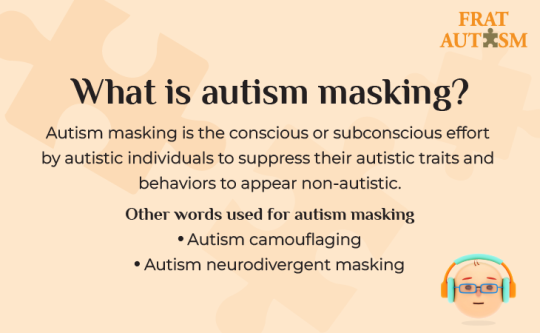
What Does Autism Masking Look Like?
Imagine you’re playing dress-up. You put on a costume, maybe a superhero cape or a pirate hat, to fit in with the game. That is kind of what “masking” is in autism. Some autistic people act differently in social situations than they do naturally, like wearing a “social costume” to fit in.
But underneath that costume are their autistic traits, their unique way of thinking and experiencing the world. It’s like their superpowers! This table shows some differences between these “superpowers” and the “costume” some people choose to wear:
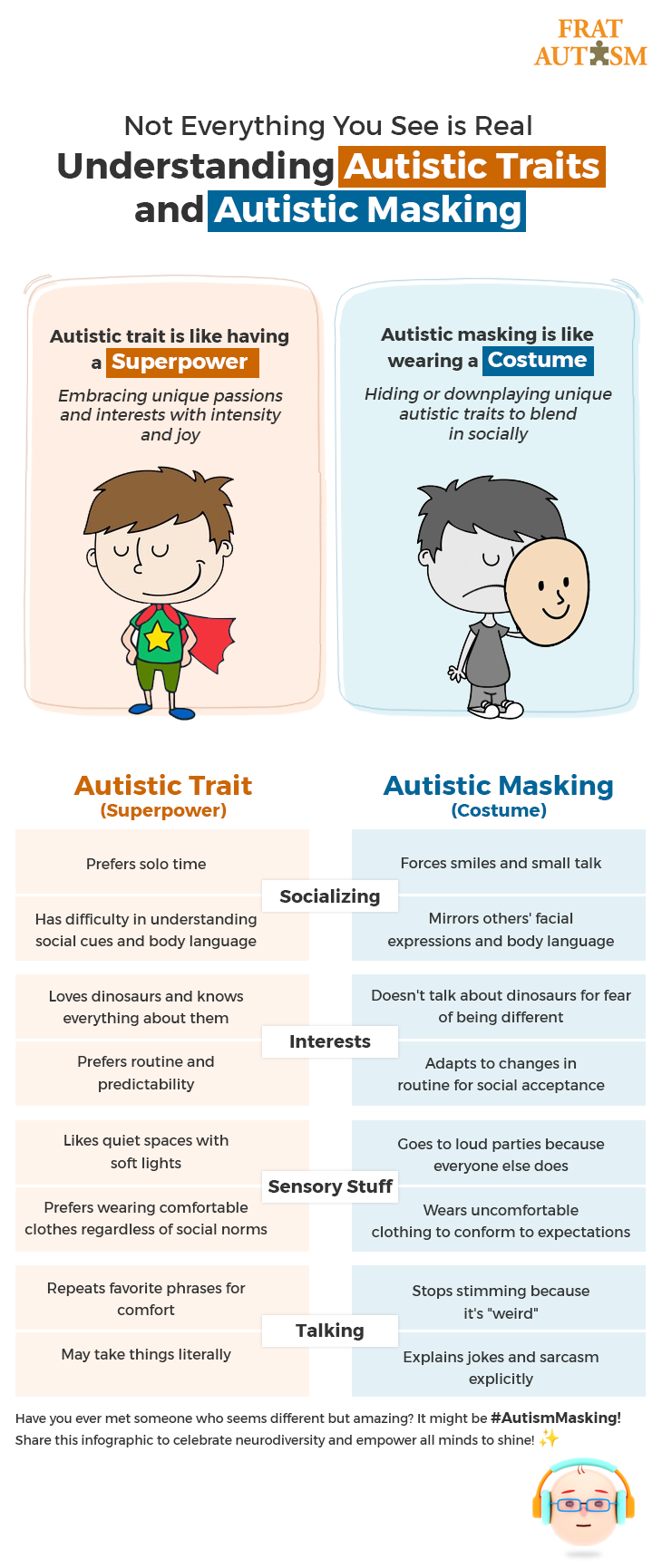
Remember, not every autistic individual wears a costume all the time, and the costume can look different for each person. The most important thing is to be kind and understanding of everyone, no matter what “costume” they wear!
Why Do Autistic People Mask?
Imagine living in a world where your natural way of interacting, processing information, and experiencing joy makes you stand out. Imagine the subtle (and sometimes not-so-subtle) cues that tell you you’re “different,” that your unique perspective isn’t always welcome. This, unfortunately, is the reality for many autistic individuals who engage in masking, a complex phenomenon where they adapt their behavior to conform to social expectations.
The core driver behind masking lies in the universal human desire for belonging and acceptance. We are innately wired to connect with others, and rejection stings deeply. Autistic individuals, unfortunately, often face social rejection due to their neurodivergent traits. Stimming behaviors, sensory sensitivities, and even blunt honesty can be misconstrued as “weird” or “inappropriate” by neurotypical individuals, leading to ostracism and bullying. To navigate this challenging social landscape, many autistic individuals choose to mask their natural behaviors.
Understanding why autistic people mask is crucial for building a more inclusive and accepting world. By recognizing the inherent desire for connection and the challenges faced due to neurodivergence, we can create spaces where autistic individuals feel safe to express themselves authentically, without fear of rejection or judgment.
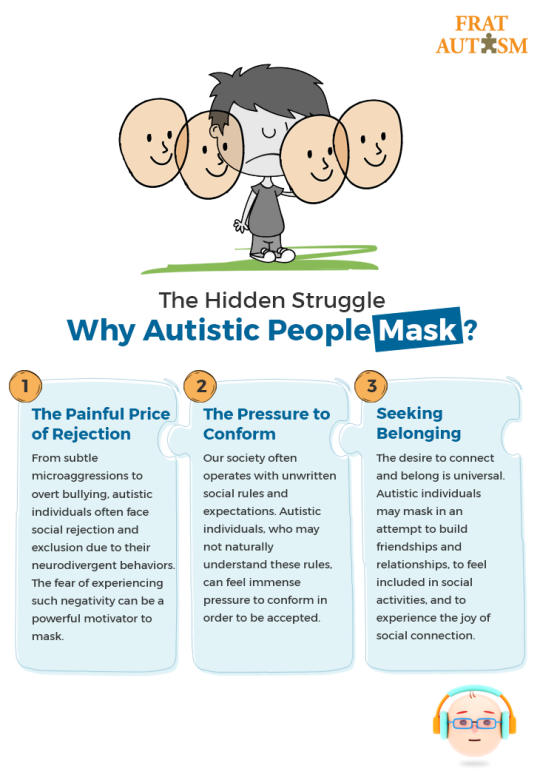
Is Autistic Masking Good?
It’s crucial to remember that masking is not a choice but a coping mechanism. While masking can offer some short-term relief from social anxieties, it comes at a significant cost.
Mental Health Impact: Masking can be mentally and emotionally draining, leading to anxiety, depression, and burnout. Suppressing one’s authentic self for extended periods can take a toll on self-esteem and well-being.
On Stress & Anxiety: The 2019 study on Understanding the Reasons, Contexts and Costs of Camouflaging for Autistic Adults[1] revealed higher stress and anxiety in people who masked autistic traits frequently compared to those who masked less often.
On Depression: In 2018, research (Experiences of Autism Acceptance and Mental Health in Autistic Adults)[2] revealed that autistic adults who masked their traits more often were more likely to experience depression and feel socially ostracized.
Exhaustion: A 2016 NIH study[3] found that autistic women who masked their traits to conform to neurotypical expectations reported feeling exhausted by the constant effort.
Loss of Identity: Masking can create a disconnect between an individual’s true self and the persona they present to the world. This can lead to feelings of inauthenticity and confusion about one’s identity.
Limited Potential: Masking can prevent autistic individuals from fully expressing their unique strengths and talents. By hiding their true selves, they may miss opportunities to connect with others who share their interests and perspectives.
Perpetuating Stereotypes: Masking reinforces the idea that there is only one “right” way to be social, further marginalizing autistic individuals and their unique experiences.
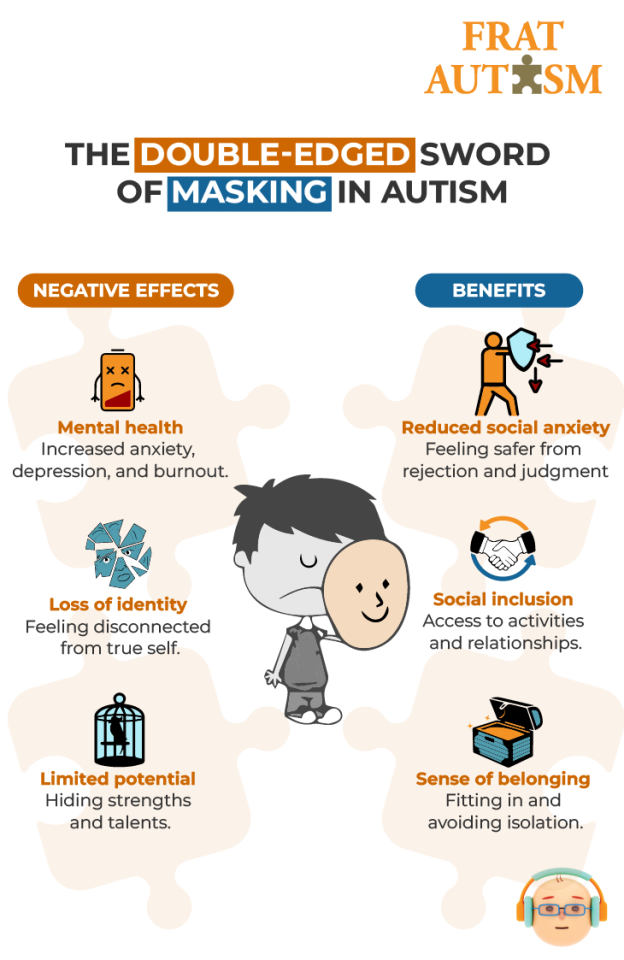
4 notes
·
View notes
Note
Hi! My workplace has asked me (self diagnosed autistic) to be the major player in writing an informational email about autism acceptance month for my workplace. I have some resources and websites that I like (autism self advocacy network among others) but obviously I don’t speak for all of us and would love more opinions and perspectives! Are there groups or websites that you feel have accurate and respectful information?
That's exciting! I really like the Autistic Women's and Nonbinary Network stuff, if that's something you think people would appreciate. I also think that local organizations are helpful, like we have one in my state for neurodiversity. All Brains Belong Vermont has some good stuff too. There might even be more local communities if you live somewhere that's got a big autistic population or even just a few really dedicated people.
I also like Text Help, which is actually a software company, but has some articles about neurodiversity inclusion in general, including autism, specifically in the workplace. It was actually recommended by someone on tumblr (I am sorry, I forgot who).
Unfortunately, good resources can be limited, especially for autistic adults who are in the workforce. Unemployment and under employment are huge problems for autists, and so if we don't exist in those spaces, resources aren't created or available for us. But those are my suggestions.
Good luck! I'd love to hear how your email turns out.
2 notes
·
View notes
Text
Three Months In: Reflecting on Our Journey and Looking Ahead
Hello everyone,
As we reach the three-month mark since the inception of this blog, I wanted to take a moment to reflect on our journey so far and discuss the future direction of this space. First and foremost, I want to express my deepest gratitude to each and every one of you for being a part of this community. Your engagement, questions, and shared experiences have made this blog what it is today.
Our Mission: The primary goal of this blog, "autism-unfiltered," is to create a safe and inclusive space for discussing all aspects of Autism Spectrum Disorder (ASD). From scientific research to personal experiences, we aim to cover a broad range of topics that resonate with both individuals on the spectrum and those who wish to understand more about autism.
What We've Done: Over the past three months, we've delved into various subjects such as the neurology of autism, the role of genetics, and sensory processing, among others. We've also opened up discussions around these topics, allowing for a diverse range of perspectives to be heard.
What's Next: As we move forward, I plan to introduce more interactive elements like Q&A sessions, guest posts from experts in the field, and perhaps even some webinars. I'm also open to exploring topics that you, the community, are interested in.
Feedback and Suggestions: Your feedback is invaluable to the growth and improvement of this blog. I would love to hear your thoughts on what you think has been working well and where you think there might be room for improvement. Please feel free to share your suggestions, either publicly or anonymously. Anonymous feedback is especially welcome if it allows you to be more candid.
What topics would you like to see covered in the future?
More scientific research
Personal experiences
Coping strategies
Do you have any suggestions for improving the blog?
Thank you for taking the time to read this post. I look forward to your feedback and to continuing this journey with all of you.
#neurodiversity#autistic#acutally autistic#autism spectrum condition#autismunfiltered#self love#autism#feminism#neurodivergent#actuallyautistic
2 notes
·
View notes
Note
can you say anything about what happened in cloud9? so we know who to watch out for in the future
i'm just going to give a little bit of insight, i don't want to add screenshots until the muns involved have given the okay. tw: anti-blackness, misogyny, mentions of sexual content, ableism
the reason cloud9 closed was because a member (or multiple) had gone to the admin about how the negative subtweets during a draft drop had made them uncomfortable. the admin had made multiple tweets asking the group to avoid doing that sort of thing. completely understandable and reasonable! however, the admin had gone to a black muse's mun and told them they were creating a hostile environment and creating an unwelcoming space for others. mind you, there were many people dropping negative tweets during this draft drop and that language is just not appropriate when speaking about a black person. when the mun responded and asked for more detail, the admin sent one last message blocked them so they couldnt respond anymore. PLEASE BE MORE MINDFUL OF THE LANGUAGE YOU USE TOWARDS MUSES AND MUNS OF COLOR PLEASEEEEEE
after members called the admin out, they posted a thread saying there were "harmful allegations" (allegations? we had seen the dms they sent the mun. it wasnt allegations.) and that they were only trying to issue warnings. there was no real apology ever given. not a good one at least.
when then found out who this admin was. the character wasnt very inclusive, didnt exist out of their ship, and just completely showed favoritism to their own character. they said someone else (who did way more to be inclusive than they ever did) was unwelcoming, but couldnt even be bothered themselves. i'm telling you right now, the members did more for the group than the admin did. from games to movie night to making sure every single intro and selfie got traction. they were wonderful people and so inclusive.
not to mention the passive aggressiveness when confronting any of the other muns about anything. talking about "backseat adminning" over NOTHING. normally i am alllll for admins and on their defense team but a lot of the people who came forward about how this admin treated them were absolutely not in the wrong.
after all this, they deactivated their muse's account, the main account, and their ship partner deactivated too...
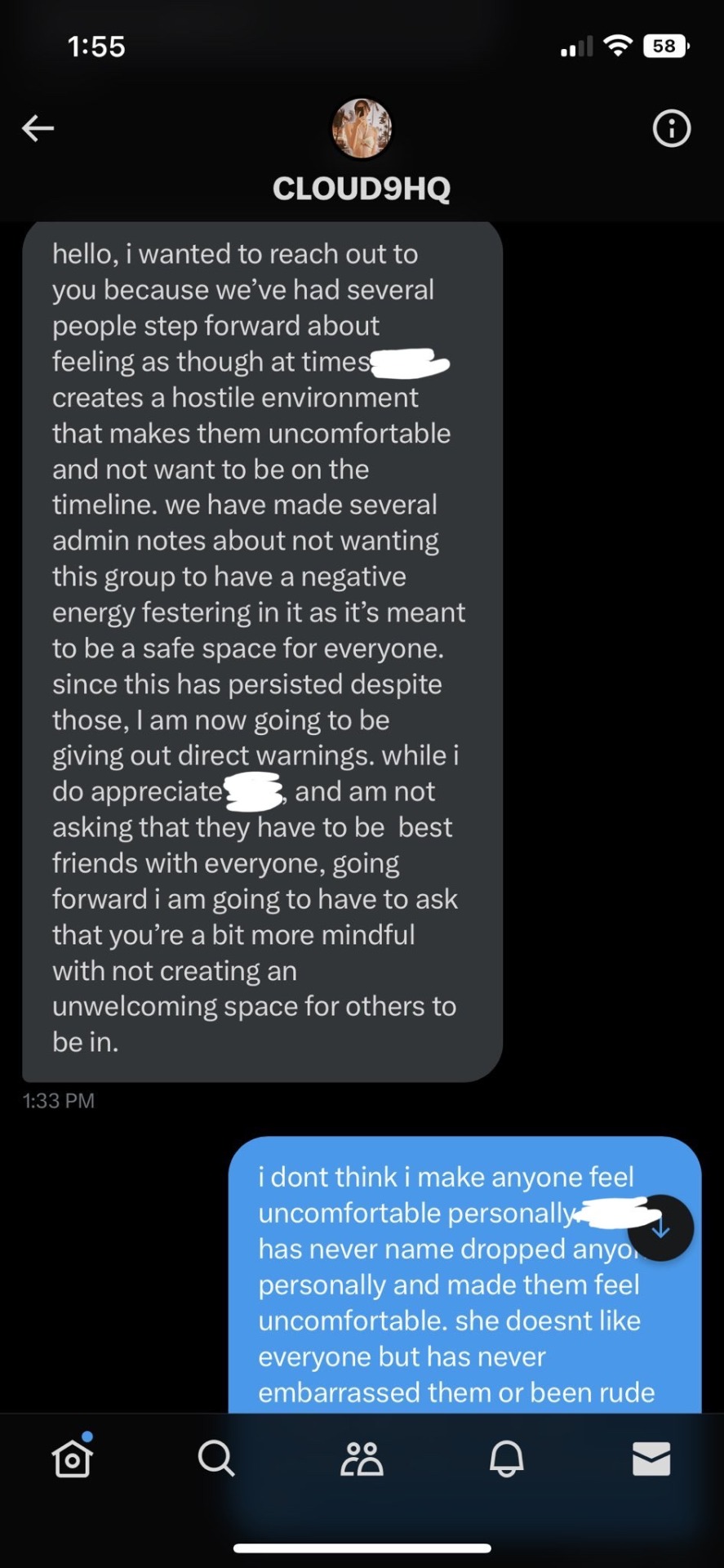
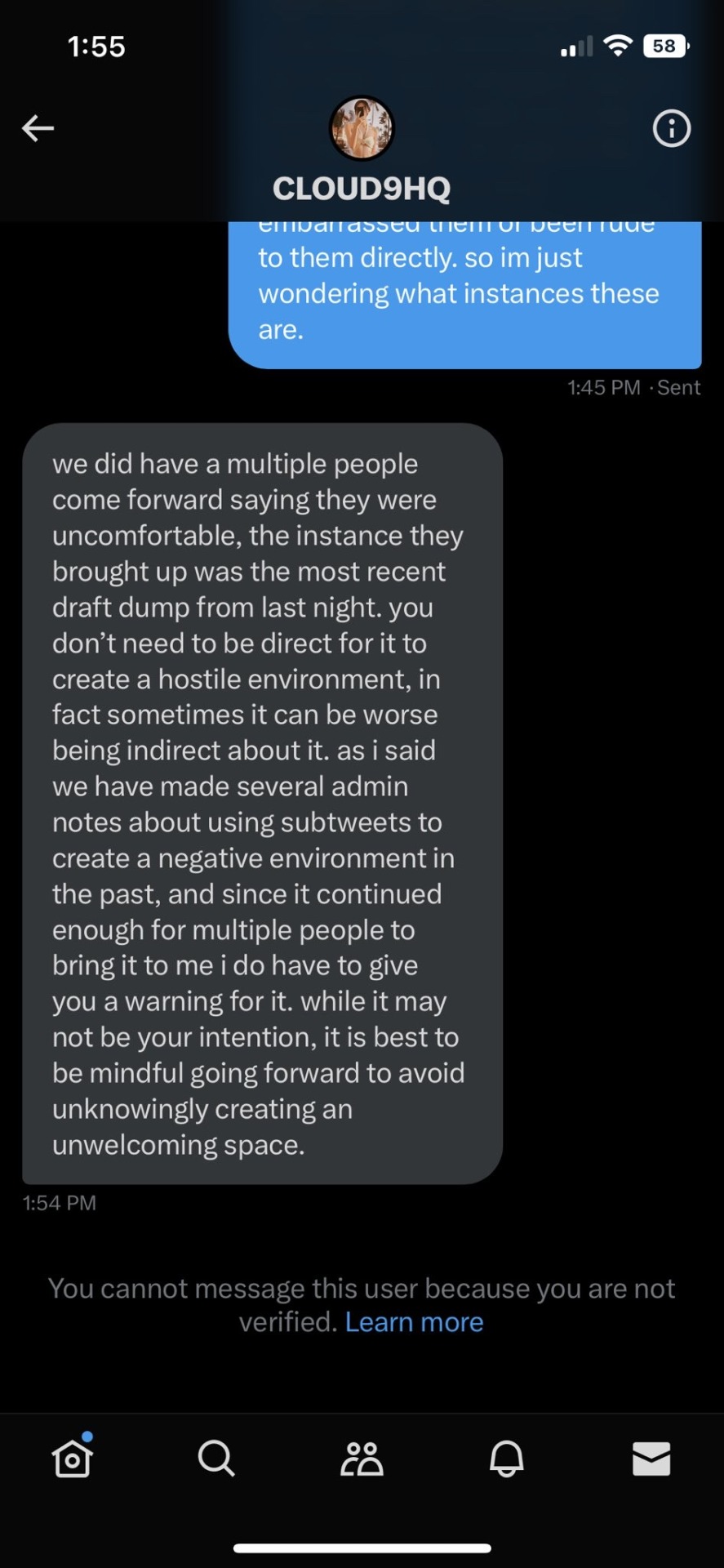
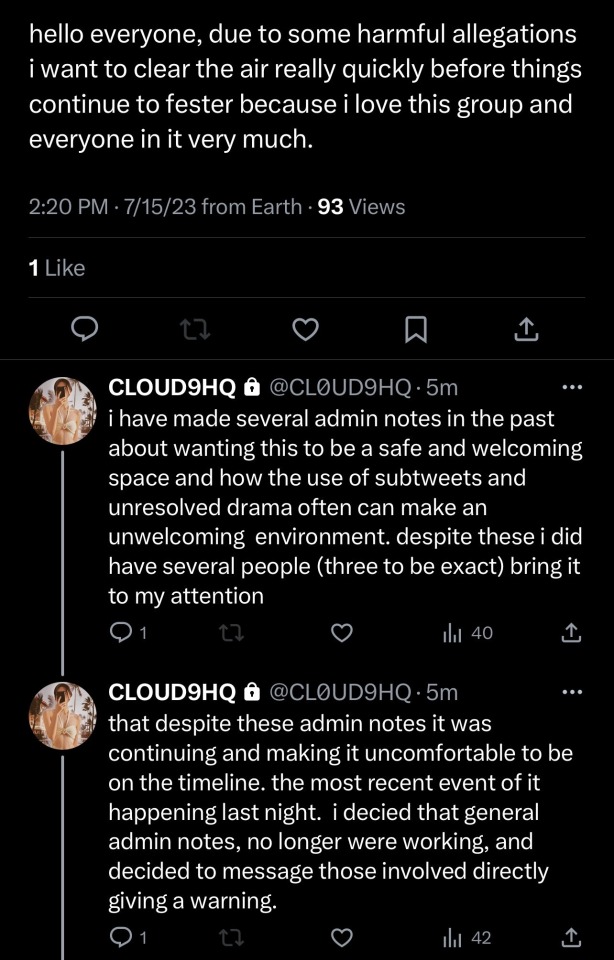
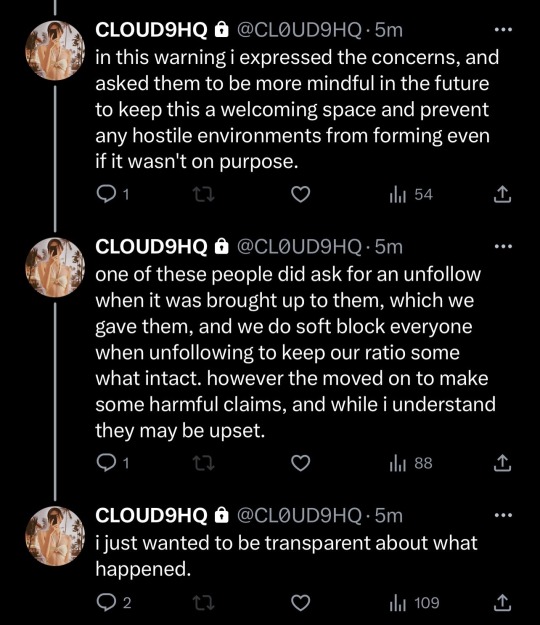
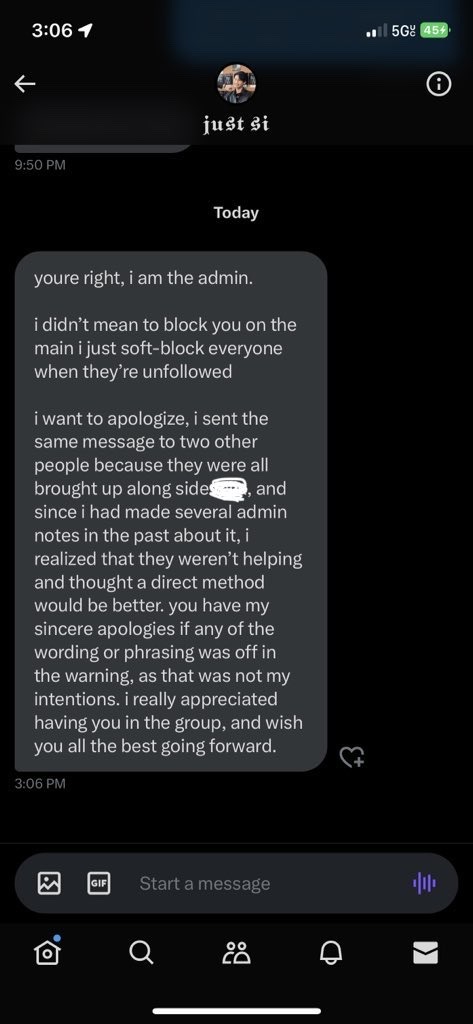
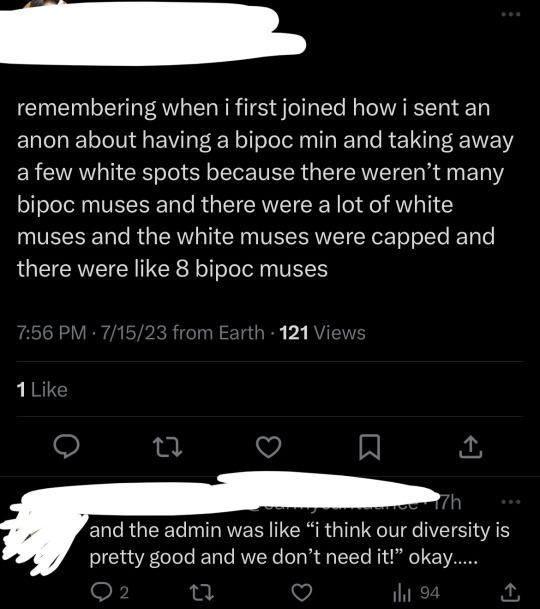
another person spoken about was a former member of the group. this person made 15+ muns uncomfortable.
there was an instance with ableism where they were incredibly aggressive towards someone with autism after a miscommunication issue.
there were many instances with misogyny where he talked nasty about "fem-presenting" fcs. ESPECIALLY, if he was dickriding their potential ship partners. he would talk shit about them to other muses and even talk about wanted to fuck their partners right to them.
he sent unsolicited dick AND ass pics (i don't know if everyone experienced this but my muse did and it wasnt just one time.) it doesnt matter if this was a smut group, majority of the muses and muns here knew how to respect boundaries. this person absolutely did not.
back to the dickriding, BOTH of the characters this mun played only really spoke to men and couldn't hold conversation with many people outside of sex talk. again, yes this was a smut group. but my muse had a sexual connection with two people the entire time they were there and had AMAZING friendships. even 30+ dms a day. if you're only in a group (ANY GROUP) to have sexual connections, maybe you shouldnt be joining any groups.
nobody felt like they could say anything because feeling that uncomfortable with both a member AND an admin can make it extremely hard.
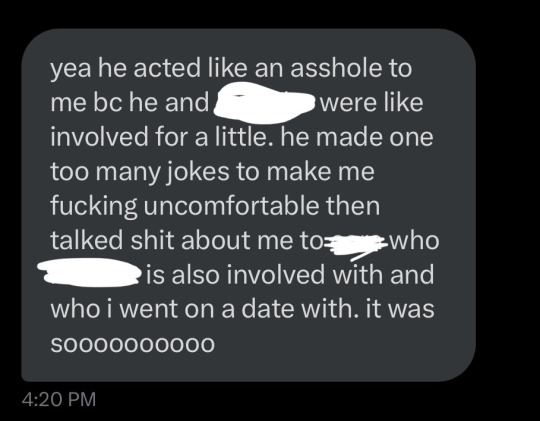
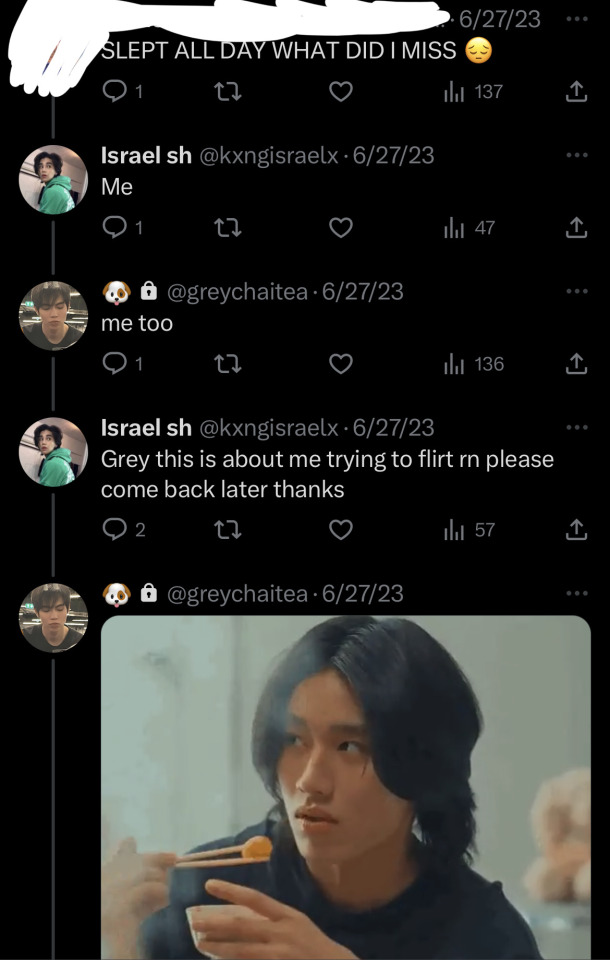
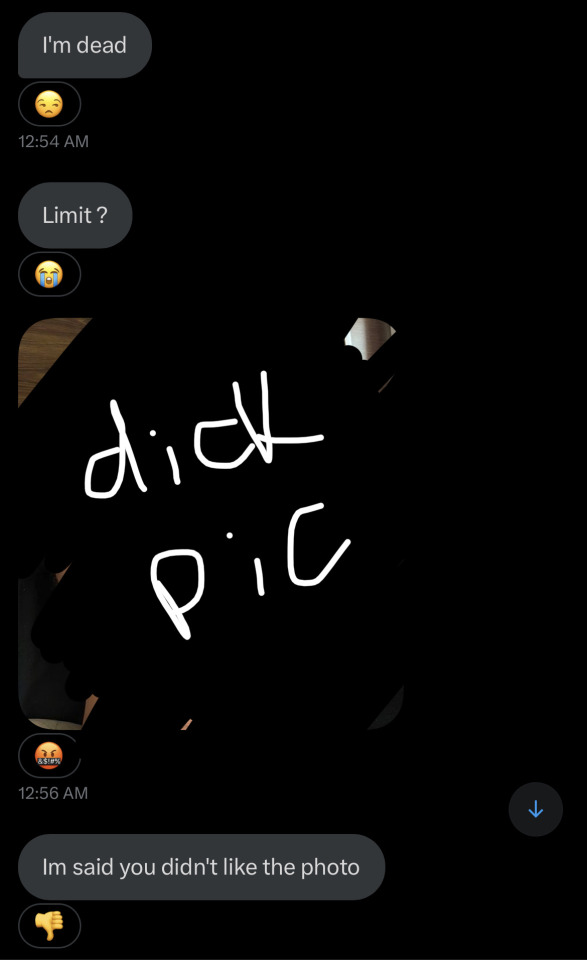
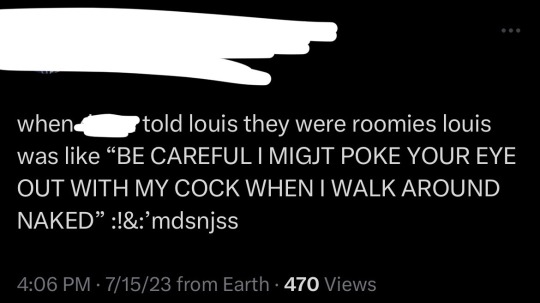
i hit 10 image limit... but i dont think either of these muns will be in poki but i am VERY sure that the amount of people that stood up for each other today, will let the admins know if there's something to worry about. and if you werent in cloud9, do not let this deter you from poki!!! looking at the apps, these are wonderful potential characters and these admins have put a lot of hard work into it. but if ANYONE makes you uncomfortable in ANY group, please talk to them directly or if you're nervous about the confrontation, go to the admins. your feelings are important and, if theres anything i've learned from this, a lot of people might feel the same as you.
2 notes
·
View notes
Text
Celebrating Neurodiversity on Autistic Pride Day
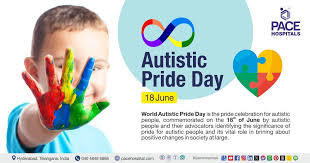
Celebrating Neurodiversity on Autistic Pride Day
Introduction
Every year on June 18, the world observes autistic pride day — a global celebration of the rights, identity, and achievements of people on the autism spectrum. Unlike awareness campaigns that often portray autism as something to be fixed or cured, Autistic Pride Day emphasizes acceptance, dignity, and the value of neurodiversity. It’s a day to recognize that autistic individuals are not broken or incomplete but are uniquely wired with strengths, insights, and perspectives that enrich our world.
Understanding Autism and Neurodiversity
What is Autism?
Autism, or Autism Spectrum Disorder (ASD), is a developmental condition that affects communication, behavior, and sensory processing. It is called a "spectrum" because it manifests differently in each individual. Some may be non-verbal and require significant support, while others may lead highly independent lives and excel in their fields.
The Concept of Neurodiversity
Coined in the late 1990s, “neurodiversity” acknowledges that neurological differences, including autism, ADHD, dyslexia, and others, are natural variations of the human brain. This perspective encourages acceptance and celebration of these differences rather than viewing them as deficits.
Autistic Pride Day is deeply rooted in the neurodiversity movement. It shifts the narrative from pity or medical intervention to pride and empowerment.
The Origin and Purpose of Autistic Pride Day
When and Why It Began
Autistic Pride Day was first celebrated in 2005 and was initiated by the autism rights group Aspies For Freedom (AFF). The group wanted to create a day where autistic people could come together and express their identities with joy and confidence — similar to other pride events.
Unlike Autism Awareness Month, which is often led by neurotypical allies and medical professionals, Autistic Pride Day is unique in that it is led by autistic people themselves. It is by, for, and about the autistic community.
Symbolism
The most recognized symbol of Autistic Pride Day is the rainbow infinity loop, representing the broad and infinite diversity within the spectrum of autism. It stands for infinite possibilities, strength, and unity among neurodivergent individuals.
Importance of Celebrating Autistic Pride
1. Promotes Self-Acceptance
Autistic individuals often face stigma and pressure to conform to neurotypical standards. Autistic Pride Day provides a space for them to embrace their identities, talents, and ways of being without apology.
2. Challenges Harmful Stereotypes
There are many misconceptions about autism — for example, that all autistic people are antisocial, unemotional, or intellectually disabled. This day provides an opportunity to share accurate information and personal stories that debunk myths and highlight individuality.
3. Empowers the Community
When autistic people see themselves celebrated, not merely tolerated, it fuels confidence and self-worth. Pride celebrations provide visibility and help forge stronger communities where support and understanding thrive.
4. Educates the Public
Through blogs, talks, art, and social media, Autistic Pride Day encourages wider society to learn about the lived experiences of autistic people and how to support inclusion in meaningful ways.
How to Celebrate Autistic Pride Day
1. Listen to Autistic Voices
One of the most powerful ways to observe this day is to read blogs, watch videos, or attend talks by autistic self-advocates. Their insights can deepen your understanding and shift your perspective.
2. Host or Join Events
Many communities hold panel discussions, art exhibitions, or virtual gatherings in honor of the day. These events are inclusive spaces to celebrate autistic creativity and achievements.
3. Promote Inclusive Practices
Whether you're an educator, employer, or family member, use this day to evaluate how inclusive your environment is. Are there sensory-friendly spaces? Is your communication style respectful and accommodating?
4. Use Social Media to Spread Awareness
Share informative posts, hashtags like #AutisticPride or #Neurodiversity, and graphics that highlight autistic pride. Raising awareness online helps shift the cultural narrative around autism.
What Allies Can Do
Being an ally doesn't mean speaking for autistic people — it means listening to them, standing alongside them, and amplifying their voices.
Avoid speaking over or for the autistic community.
Respect sensory needs and communication preferences.
Challenge ableist attitudes or language when you hear them.
Support organizations run by autistic individuals.
Celebrating Diversity in All Forms
Inclusion is not about expecting autistic people to fit into our world — it’s about creating a world where everyone feels they belong. This means recognizing that communication differences, sensory preferences, and social styles are just that: differences, not deficits.
Autistic Pride Day reminds us that we all benefit from a society that values different ways of thinking and being. Whether it’s in art, technology, education, or everyday interactions, neurodivergent minds contribute immense value when given the opportunity to thrive.
Conclusion
Autistic pride day is not just a day of celebration — it’s a movement toward a more compassionate and equitable world. It champions the idea that every brain is different, and that’s something to be proud of. As we celebrate this important day, let us not only honor the achievements of the autistic community but also commit to breaking down barriers and building a more inclusive future for all.
0 notes
Text
Best Autism Therapy Center In Hyderabad

Pinnacle Blooms Network is recognized as Asia’s largest chain of autism therapy centers, dedicated to empowering children with neurological and developmental conditions. Here’s a deeper look at what makes Pinnacle stand out:
Key Features of Pinnacle Blooms Network:
Multi-Sensory Therapy Approach: Pinnacle integrates Speech Therapy, Occupational Therapy, ABA Therapy, Special Education, and Psychological Counseling to provide a comprehensive therapy experience.
AbilityScore® & TherapeuticAI®: These patented tools help assess and personalize therapy plans, ensuring measurable progress for each child.
Global Reach: With 7000+ centers planned across 230+ countries, Pinnacle aims to bring therapy accessibility worldwide.
Proven Success: Over 19M+ therapy sessions conducted, with a 97%+ success rate and 96%+ parental satisfaction.
Expert-Led Therapy: More than 80 certified therapists work under the Pinnacle brand, ensuring high-quality, evidence-based therapy.
TherapySphere™ Multi-Sensory Rooms: These specialized environments create a safe and engaging space for therapy, enhancing learning and development.
Locations in Hyderabad
Pinnacle Blooms Network operates multiple centers across Hyderabad, including:
Sanathnagar — Above ICICI Bank, Industrial Estate
Jubilee Hills — Near Sangeetha Studio
Begumpet — Chikoti Gardens
Gachibowli — Botanical Garden Road
Santosh Nagar — Saidabad Main Road
Pragathi Nagar — Pragathi Nagar Road
How to Get Started?
Families can book a free AbilityScore® assessment to understand their child’s developmental needs and receive a personalized therapy plan.
For more details, visit Pinnacle Blooms Network or call +91 9100 181 181 to schedule a consultation.
Pinnacle Blooms Network is more than just a therapy center — it’s a movement towards inclusion, empowerment, and dignity
#abilityscore#behavioural therapy#speech therapy#autismawarenessmonth#yoga therapy#pinnaclebloomsnetwork#freespeechscreening#pinnacleblooms#special education#call9100181181
0 notes